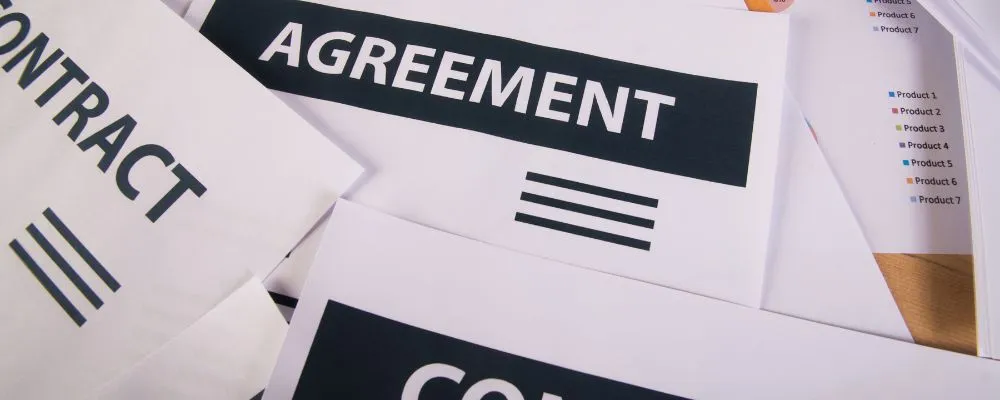In the rapid and complicated construction industry, contractual agreements are crucial for ensuring project success. All the people involved, developers, contractors, subcontractors, architects, engineers, and suppliers, must follow these legal contracts to ensure they know their duties and responsibilities. Writing thorough and well-organized construction contracts is important to reduce risks, settle disagreements, and protect everyone’s interests.
Whether you’re a seasoned construction worker or just starting out, knowing the ins and outs of construction contracts and being aware of common pitfalls can make a big difference in how well your projects turn out. In this blog, Brick & Bolt will talk about useful drafting tips and some of the most common mistakes you should never make when working with construction contracts.
What are Construction Contracts?
Construction contracts are deals between a client and a contractor to do certain work. They are legally binding. There are clear instructions in these contracts about the work that needs to be done, when it needs to be done, how much it costs, and who is responsible for what. To keep disagreements from happening during the building process, it’s important to communicate clearly and keep thorough records. Also, contracts usually have ways to settle disagreements and deal with changes in the project’s scope or unplanned events.
Drafting Tips for Effective Construction Contracts:

1. Clear and Concise Language:
Construction contracts should be written clearly, concisely, and briefly. Do not use law terms or words that are too technical and could be misunderstood. Make sure that terms, jobs, and responsibilities are clearly stated to avoid disagreements caused by misunderstandings. It is important to ensure that everyone can understand the language used, even if they don’t know much about law or technology.
2. Detailed Scope of Work:
Outline the work that needs to be done, including a full description of the project, the materials that will be used, the specs, and any special needs or restrictions. This work should leave no room for doubt, and everyone involved should read it over and agree to it. Because the scope of work should be very clear, there shouldn’t be any misunderstandings or wrong assumptions during the project completion phase.
3. Payment Terms and Schedule:
Make the payment terms very clear. This should include the contract’s total value, payment milestones, and any fines or rewards for paying on time or late. Describe how to send invoices, process payments, and handle disputes that arise from payment problems. It is important to set up a clear and fair payment plan that takes into account how far along the work is, how much it costs, and any possible delays or problems.
4. Timeline and Project Scheduling:
Set reasonable due dates for the project, taking into account possible delays or unplanned events. There should be clauses for extensions, liquidated damages, and fines for delays that are the party’s fault. A clear project schedule helps keep everyone on track with their expectations and gives you a way to measure success and think about possible rewards or punishments.
5. Risk Allocation and Liability:
Carefully divide up the risks and responsibilities among the people involved. Make it clear who is responsible for getting the right permits, getting insurance, following safety rules, and taking care of any possible environmental problems or dangerous materials. Risk sharing should be carefully thought out based on what each party can do, how much they know, and how much power they have over certain parts of the project.
6. Clauses for Change Order Procedures:
Changes or modifications are often made during a construction job. Establish clear rules for handling change orders, such as how to ask for, approve, and record changes, as well as the costs associated with them.
7. Ways to Settle Disagreements:
Describe the steps that will be taken to settle any disagreements that may come up during the job. Depending on the type of disagreement and how bad it is, this could include rules for mediation, arbitration, or going to court.
8. Termination Clauses:
Make it clear when either party can exit the contract, such as when there are major breaches, insolvency, or events beyond their control. Make sure everyone knows their rights and responsibilities if the agreement is broken.
Common Pitfalls to Avoid in Construction Contract Drafting:

1. Ambiguous or Unclear Language:
Uncertainty or ambiguity in a building contract can lead to misunderstandings, disagreements, and expensive court cases. Ensure that all of the conditions, terms, and rules are written in a way that is easy to understand. It is also a good idea to have a lawyer look over the contract to find and fix any unclear or inconsistent parts.
2. Incomplete or Missing Clauses:
If important clauses or provisions aren’t included in a building contract, important parts of the project might not be covered, which could lead to disputes and legal problems later on. Carefully read over and make sure that all the necessary terms are included.
3. Unrealistic Timelines or Budgets:
Setting deadlines or budgets that are too tight can put too much pressure on everyone involved and lead to delays, cost overruns, and disagreements. Make sure that everyone involved carefully reviews the schedules and budgets and agrees on them.
4. Failure to Allocate Risks Appropriately:
If risks and responsibilities aren’t shared correctly, it can cause disagreements, financial losses, and project delays. Carefully review the risks and assign them to each party based on their skills, knowledge, and power over different parts of the project.
5. Lack of Proper Review and Negotiation:
If you rush through the process of writing a contract without doing enough review and negotiation, you could make mistakes, end up with terms that aren’t fair, and have legal problems in the future. Allow enough time for everyone to carefully look over, negotiate, and work together on the plan.
6. Non-compliance with Laws and Regulations:
If people don’t follow the laws, rules, and industry standards that apply to them, they could face legal problems, fines, and project delays. Ensure that the contract follows all applicable laws and business best practices.
Construction workers can improve and enhance their contractual agreements by following these drafting tips and avoiding common pitfalls. Well-written construction contracts protect everyone’s interests and encourage everyone to work together and get things done, which helps projects finish successfully.
Remember that getting help from experienced construction attorneys can be very helpful in making sure that your contracts are complete, enforceable, and in line with best practices in the industry. Including important people, like architects, engineers, and project managers, in the contract drafting and reviewing the contract can also give useful information and help find possible problems or trouble spots. You can reduce risks, settle disagreements quickly, and set the stage for successful building projects that benefit everyone if you put in the time and effort to write and negotiate contracts.

